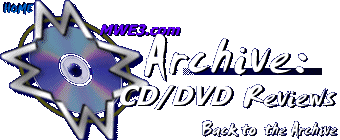
|
January/February 2002
|
|||||||
 SCOTT McGILL / MICHAEL MANRING/ VIC STEVENS |

MICK RALPHS |

CHRIS MICHIE |

JEAN LUC PONTY |

CARL VERHEYEN |
||||
|
RICHARD SEARLES The Green Man (Earth Dance)
|
||||||||
|
SCOTT McGILL
/ MICHAEL MANRING/ VIC STEVENS Addition By Subtraction (Free Electric Sound)
|
||||||||
|
MICK RALPHS Itís All Good (Angel Air)
|
||||||||
|
CHRIS MICHIE Goyer Golf Suite (Marin)
|
||||||||
|
JEAN LUC PONTY Life Enigma (JLP)
|
||||||||
|
CARL VERHEYEN Solo Guitar Improvisations (CMG)
The following interview with Carl Verheyen took place on November 19, 2001. Carl Verheyen: CV Robert Silverstein: RS RS: Carl, congratulations on the Solo Guitar Improvisations CD. After recording the high energy rock and blues flavored Slingshot in 1998, what led you to record the all instrumental, mostly acoustic guitar Solo Guitar Improvisations CD? CV: Whatís going on is I decided to separate the band thing that I do, that tours regularly and that makes records regularly, with sort of a solo career, because I play acoustic and I actually play acoustic guitar, yíknow solo guitar concerts around town here and Iíve done them...Iíve done Ďem all over the place really, but mostly around L.A. So just because there was sort of a demand from the fans like that, yíknow I decided to start recording a few pieces and then it went on and on and pretty soon I decided to release an album of that stuff. So that was basically it. RS: So the album was recorded over a period of time. CV: It was mainly recorded over a period of about three months, but on the record there are a few old compositions that I took directly off my old records. Like "Big Sur" is one of them, thatís off my first record. And then, letís see, "Howdy Control" and "Mercury Rain". Those three were previously released. Then what I did was rerecord a couple of my older ones like "Wildflowers #2" and "Not Yet Chet" and then I recorded all the other ones from scratch. First one I did was "God Bless The Child" and thatís sort of where the title of the record came from. That was just completely improvised. I was basically sitting around waiting to record and the guy was rolling tape so I just kind of improvised that arrangement right on the spot. And we liked it so much we just said, Ďthis is good, letís keep this goingí. RS: So the album was recorded this past year? CV: Letís see... yes it was recorded this past year, earlier this year. RS: Solo Guitar Improvisations features a number of great tracks highlighted by the 8 minute album closing "Partington Cove Suite", which combines a number of guitars. That track really sounds like you spent alot of time arranging the guitar sounds to get the sound just right. CV: The way that one worked out was, my string company - which is Thomastick-Infeld Strings - they called me one time a couple years ago and said Ďweíd like to do a compilation disc of our main endorsers, would you like to be involved? We need two songs a piece from each of our endorsersí. And I was working on a new band album and I said I really donít have two songs, but Iíve got this guitar solo that I wrote called "Partington Cove", maybe I could sort of flesh it out into a long version and just do it myself. And they were really into the idea and so was I. They had hired Eddie Kramer to produce the thing. So that was really fun to work with him. He was interesting to work with. He took alot of time and alot of care. Heís got quite a good ear. Heís a good musician. RS: Heís got such a legacy from those great albums with Jimi Hendrix. CV: Yeah! And the list goes on...Traffic and Led Zeppelin and all kinds of people. RS: Are you planning to work with him again? CV: I sure would like to. Heís expressed interest in producing a band record. All Iíve got to do is come up with a decent enough budget (laughter) for the next album to be able to hire him, to use him on it, because it would sure be fun. RS: In the CD booklet you say that playing and arranging the solo guitar pieces was even more challenging than arranging the orchestral "Partington Cove" guitar suite. CV: Yeah, in a way it is because with the suite thing I knew I could rely on overdubs. So I could do my, sort of, ethereal string stuff and I could do my baritone guitar and all that stuff. But when youíre just trying to carry it with one single guitar, I find that alot more challenging. As a matter of fact, I was just doing it right now, before you called. I was just playing the tune, "Yes It Is" by The Beatles. And I was just thinking in terms of my record, thinking if I ever do a volume two, this would be nice, because itís an open enough tune to where you can improvise on it. Improvising for me has always been the heart and soul of playing. Itís one thing to have your pieces and your compositions down, and you can nail em, but itís another thing to have them down and have the breath and openness, within the composition to let it live and breathe each time you play it a little bit differently. RS: Solo Guitar Improvisations features a wide range of cover tunes as well and thereís even a great cover of The Kinksí "Sunny Afternoon" which you say lends itself to some spontaneous soloing. CV: Well that tune...I was playing along with it on the record and I realized the chord changes, in the verse and in the chorus, were nice open guitar kind of chords. It was in the key of D minor, went to a G or C. It definitely lends itself to open strings, sort of a bass line, and some single note stuff too. That one in particular just felt good. And it had such an obvious structure. And another nice thing about covering a tune like that, and that makes it good as a cover tune, is that people are so familiar with it that they can hear the chords going by when youíre blowing on it, yíknow they can hear the structure happening. So that was fun. RS: Any other songs youíd like to cover? CV: Well my band covers a few things. We cover "Little Wing" by Hendrix. I didnít put that one on the album because itís a vocal when we cover it. But our version is so different and so wide open and interesting that itíll be great one when I finally record it one day I think. But I didnít do it on this record because it does need the vocal and so many people have done it. RS: In 1985 you joined the British rock group Supertramp after Roger Hodgson left, playing stadium shows all across the U.S., Canada and Europe, selling out huge arenas in eight countries. You also toured with them in Ď86 and Ď97. How did you become a member of Supertramp? CV: Yeah, well what happened with that was they auditioned people after Roger left to sort of fill his shoes, and they hired me on the guitar and vocals but they hired another guy on keyboard and vocals, whoís a real strong vocalist. He actually sounds like him. And the two of us have been in it ever since. Initially we were side men and kind of paid more a salary kind of a thing. In Ď96, when they did another record, they asked us to join the band and actually become members. And so we have another kind of big giant tour coming up in 2002. We just finished, actually theyíre still working on the vocals and stuff but, we just finished another Supertramp album for release in 2002. Interestingly enough, itís a band that is huge in Europe. I mean this band has sold like seven million records the last time out, yíknow in Europe, the last record. Here in the States, itís more just a nostalgia band. But overseas itís enjoying success of like, yíknow, as good as it gets. So itís a fun thing to be in and I like that music. I love those old tunes and stuff so... RS: I know the keyboard player, heís the original guy right? CV: Yeah, thatís a guy named Rick Davies. Rickís sort of the leader. Itís his vision. And itís a very detailed and deep vision that he has going. Iím amazed. Heís one of my musical heroes and heís one of the most consistent musicians Iíve ever met. RS: How many albums did you make with Supertramp? CV: Well now Iíve made three. This new one thatíll come out will be my third. I joined the band right after they finished one called Brother Where You Bound? And I did that tour. Then they didnít do anything till Ď96 when they made Some Things Never Change. I did that one and then we toured under that one and made a live record at the Albert Hall, which I think is the best Supertramp record ever. Itís called It Was The Best Of Times. Itís real nice record, I really dig it. Itís got all the hits, but itís got a bunch of new stuff too. The best versions of all those old tunes, I think. And then we just finished a new one. I donít even know what the title of this oneís gonna be called. But itís gonna take me out of circulation for a while next year. Iím gonna go out on the road with them from about April till the end of July. RS: Your fourth CD Slingshot was entirely conceived and written during downtime on the '97 Supertramp World Tour. Thereís a wealth of blues rock and some great guitar playing on Slingshot but thereís also some quite melodic tunes like the title track "Slingshot" and the album closer "Carried West". How do you compare your more melodic rock pieces like the title track with the more bluesy and rocked out material? CV: Iím a guy thatís been accused of straying too far from one specific style. But then again, itís just what I want to hear and what I wanna do. I donít really want to stay with one style. Like if you asked me to make a 12 bar blues record that was just 12 bar blues, the entire record, I could easily do it and I would do my best and maybe make it fairly interesting, but on the other hand itís just not what I wanna hear. So I think thatís my thing. I just make records that I wanna hear. And the blues is sort of underlying everything I do. I know Iím a blues-based player and thatís what I like to listen to. Iím very inspired by people like Albert King and Howliní Wolf and Muddy Waters, but I donít just want to regurgitate their stuff, yíknow? Iím not inspired by yet another white guy playing that stuff, yíknow? (laughter) RS: Sort of like groups like Cream and The Yardbirds, who were bluesy and sort of experimental pop too. CV: Thatís exactly what my band does live Robert. We come out and weíll play a 12 bar blues, like a slow blues in C minor, but towards the end of it, weíll ramp it up into a sort of an African groove and jam on it for a while. Itís very reminiscent of stuff like Cream and Jimi Hendrix Experience and some of those bands. Iíve got real virtuoso players on bass and drums in my band and we have so much fun, exciting live concerts. Itís interesting, people are really relating to that aspect of our band, the jam aspect, because weíre jamming and weíre blowing on a real high level and therefore kids that are used to hearing the Grateful Dead to it for instance, when they hear us do it yíknow theyíre going Ďwow, thatís really somethingí. I have a background in people like Coltrane and Sonny Rollins, as well as Keith Richards and Lennon & McCartney. RS: How about comparing your vocal music with the instrumental sides? CV: I really enjoy music with vocals in it for the most part. Once again, in an effort to make records that I want to listen to and will live for me for a long time, I think the vocal thing is important. Like I said, I just prefer vocal music. However, Iím a guitar player first, way before Iím a singer and therefore I feel that I got a fan base that want to hear some of that. And I enjoy doing that too. But I just donít want to make total instrumental records for the most part. This solo guitar thing was an exception though just Ďcos itís just a chance to sit down with the acoustic guitar and make some music by yourself. RS: How do you balance your studio session work with your solo albums? CV: Yeah, thatís kind of difficult. Being a member of Supertramp and being a studio guitarist in L.A. that works just about everyday and then having a solo career...itís basically three careers. And the balance gets difficult. This next year will be real hard because Supertramp, which only happens about twice a decade, is gonna happen yíknow? So this next year is gonna be pretty tough. My first thing Iím doing...Iím going to England for a ten day tour of the U.K. with my band the first week of February, then Iím home for about a month, and then Iím going to Europe and rehearsing with Supertramp and starting about a three and a half month tour in Europe and then Iíll be back starting the first of August. The main thing about the sessions is...thereís a number of guys I work for in L.A. that will always call me. All I got to do is let them know Iím in town. So I look at it like, there will always be sessions. The things that are special are getting a chance to play your own music, yíknow in a club in Hamburg, Germany or getting to play in front of 20,000 people with Supertramp. Those are the sort of special things that come along that I just canít turn down. Sessions, however I feel there will always be recording sessions. I even did one yesterday morning, which was a TV show called Scrubs (laughter). So that just goes on and on and that always seems to happen for me. RS: What was it like recording with The BeeGees on their Still Waters CD? CV: It was really fun to do it. The producer did not want an L.A. sound. He said donít bring any big racks like those L.A. players. And of course Iíve got that, but I also own about 48 guitars and 20 different amplifiers. So I just had about 15 amps delivered and brought my guitar trunks. I bring about 12 acoustics and about 14 electrics to every session and then I hand carried about 10 more in. So, if he didnít want to hear effects and racks of gear, I brought a few pedal boards, 15 amps and dozens of guitars. It was like he was a kid in a candy store. He goes, Ďwell, letís hear how the Rickenbacker sounds plugged into the Voxx AC-50 and why donít we get some distortion using this Telecaster, this thin line Tele?í And so the producer, what was his name, I canít even remember right now, but he was like a kid in a candy store because I gave him all those options. RS: Are you a big guitar collector? CV: Iím a collector to the extent that I use the stuff. If I donít use it, I usually pass it on and get something that I will use. Iíve got three vintage Strats, Iíve got a Ď58, a Ď61 and a Ď65. And those seem to be my first call guitars. Then Iíve got a Ď54 Les Paul with P-90s and a Ď69 Les Paul that I put PAFís into. Then Iíve got a Ď65 ES-335 that I seem to use quite a bit and a Ď65 Rickenbacker 12 string. And then Iíve got a 1960 Telecaster, a Tele custom which is a real valuable guitar. I also have a 1969 thin line Tele. Iíve got a 1958 Gibson 175 jazz guitar. Iíve got a Ď59 Gretch 6120, yíknow Chet Atkins. RS: I know the acoustics are prominent on the new album CV: Since the new album was made though I bought a couple of Martins. I bought a Ď59 D-18 and Iím just in the process of buying a Ď51 double 0. A little tiny guitar, itís great. So those seem to be the main ones of my vintage instruments. Iíve got a couple of Reverends, a couple of custom Strats, a couple of new Strats, a baritone made by a guy called Bill DeLap, a couple of Mark Angus acoustics and then Iíve got an old Gibson L-00 from 1936 and a Gibson J-50 from 1957. And a couple of Ramirez classical guitars from the Ď70s, a couple Taylors. I guess Iíve got quite a few guitars! RS: And I know you use Thomastik-Infeld strings. What about amps? CV: Yeah, I use those Thomastik-Infeld strings. Iím a big fan of those. To my ears those are the best strings going. My main amp seems to be two 1964 AC-30s, two Voxxís. And then I have a 1965 AC-50 and then Iíve got a 1966 Marshall JTM-45 and a 1968 Marshall JMP 50 watt. Those are both plexis. And then Iíve got a 1969 Marshall 100 watt with two basket weave Ď60s era cabinets with the 25 watt greenback celestions. Then Iíve got a bunch of Fenders, Iíve got old Princetons, an old Tremelux, a Fender super reverb, all black face stuff. So over the years, if it sounds good, Iíve hung on to it. I havenít done much trading, as much as Iíve been hoarding (laughter). RS: Before the solo guitar record you recorded an album called Altas Overload. CV: Iím proud of that. Itís a total trio record. We didnít use any keyboards. Just the three of us did it. My live touring band did it, with no extras. It was a fun thing to do. Itís also the closest thing to a live record weíve ever done. Because the tracks were basically just recorded in four days and then I sang them, and played a few solos and it was finished in about 8 days. It was a real quick snapshot of where the band was. RS: Youíve appeared on a number of film soundtracks. Do you have any favorite ones? Were you on Endless Summer 2? CV: Yeah! As a matter of fact, Endless Summer 2 is credited to Gary Hoey, but I think I played on 71% of it. I think on his album thatís all him, but if thereís a soundtrack to that movie, which Iím not aware of, if there is, itís mostly me. That was a funny thing. I think Gary Hoey was hired to do it, but they wanted to use this other composer named Phil Marshall, because he was actually scoring to picture a little better, and I think thatís what happened. So when you watch the movie, itís mostly me playing on it, but Gary Hoey got credit. And I think he probably played the main title and some of the big pieces, so itís definitely his movie. I think part of the deal was it was Warner Bros. and he was on Warner Bros. so they did a little artist tie in with the label. But it was a great movie. I like those old surf movies, like Endless Summer 1 and Big Wednesday, pretty cool. One of my favorite soundtracks was The Milagro Beanfield Wars. I donít know if they made a record of that either. If they did I donít have it, but that was me and Lee Rittenour and Angel Romero. And it was really beautiful music written by Dave Grusin. RS: What about your big influences? CV: Thatís very interesting. I just made up my own CD of some of my favorite songs. It starts with Little Richard playing "Lucille" and then it has Mountain playing "Mississippi Queen" and Hendrix playing "Up From The Skies" and Mike Bloomfield doing "Albert Shuffle" and Albert King doing "Cross-Cut Saw". So Iíve got very wide tastes. I was listening to Pat Martino yesterday, his new Live At Yoshiís. Iíve got all the old Pat stuff. I think itís easier to list the people that I donít listen to. I havenít been buying alot of new records lately, but I think itís because Iíve been busy and havenít had a chance too. I know thereís a bunch of things on my list that I want to get. RS: I was reading that in 1996, in between sessions, you found the time to give (CCR guitarist/vocalist) John Fogerty guitar lessons. What was that like? CV: Oh man, heís a great guy. Heís actually a guy that I really admire for the fact that at this stage of his career, heís still very, very much interested in learning. And heís a fast learner and a good learner. Heís interested in everything - from Count Basie-Freddy Green style playing to Jerry Douglas dobro playing to everything. I mean, he wants to know how to do it all. And thatís great, Ďcos thatís sort of my thing. So, we hit it off real well. RS: What are your current activities and next recording plans? CV: Well, Iím in the middle of another band album right now. My next big thing is Iím heading out to England for the first time. We always play in Germany, Denmark, Holland, France, that kind of Northern Europe area. Weíve never played England, although Iíve been there many times with Supertramp and the BBC plays my records! They play Slingshot so I think Iíve got a pretty good fan base there. So weíre finally getting over to England the first of the year and then after that Iím doing about 3 and a half months on the road with Supertramp and then next fall, hopefully hit the road with my band again around here in the States. Next year is kind of crazy... Special thanks to Bill Stillfield at CMG Records and special thanks to Carl Verheyen. www.chasemusic.com / www.carlverheyen.com / www.supertramp.com
|
||||||||
|
|
||||||||
|
||||||||



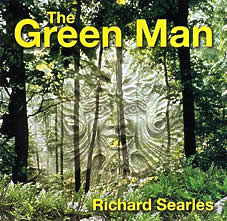 With each new album,
classical guitarist Richard Searles continues to refine his imaginative,
modern day approach to the sound of Celtic, Renaissance and World Music.
Recorded and produced by Searles in L.A., The Green Man is
compelling proof that the exquisite sounds of original, freshly recorded
Medieval Renaissance-inspired music can be successfully translated into
the present times. For his latest timeless sounding musical adventure,
Searles is accompanied by like-minded players including Patricia Mabee (harpsichord),
Tim Powell (acoustic bass) and Ron Wagner (percussion). Over
the past 16 years, Searles has recorded over ten instrumental albums
featuring a wealth of artistic performances on classical and steel
guitars, concertina and recorder and the 15 tracks on The Green Man, including
9 Searles originals, stand among his best to date. Fans of
progressive guitarist Steve Howe and nylon string classical players like
John Williams will want to check out the classically trained Searles. The
albumís amazing lead off track, "Dragonfly", sets the stage
for a magical, musical romp back into a time when acoustic instruments
ruled the earth. On The Green Man, Richard Searles puts it all
together with grace and impeccable guitar craftsmanship.
With each new album,
classical guitarist Richard Searles continues to refine his imaginative,
modern day approach to the sound of Celtic, Renaissance and World Music.
Recorded and produced by Searles in L.A., The Green Man is
compelling proof that the exquisite sounds of original, freshly recorded
Medieval Renaissance-inspired music can be successfully translated into
the present times. For his latest timeless sounding musical adventure,
Searles is accompanied by like-minded players including Patricia Mabee (harpsichord),
Tim Powell (acoustic bass) and Ron Wagner (percussion). Over
the past 16 years, Searles has recorded over ten instrumental albums
featuring a wealth of artistic performances on classical and steel
guitars, concertina and recorder and the 15 tracks on The Green Man, including
9 Searles originals, stand among his best to date. Fans of
progressive guitarist Steve Howe and nylon string classical players like
John Williams will want to check out the classically trained Searles. The
albumís amazing lead off track, "Dragonfly", sets the stage
for a magical, musical romp back into a time when acoustic instruments
ruled the earth. On The Green Man, Richard Searles puts it all
together with grace and impeccable guitar craftsmanship. 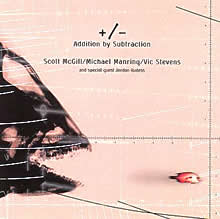 A division of The
Laserís Edge, the recently enacted Free Electric Sound label
has a real winner on their hands with Addition By Subtraction. The
CD features the compositions of rising guitar ace Scott McGill, who
is given some solid underpinning from fusion veterans Michael Manring (fretless
bass / ebow) and Vic Stevens (drums). Recorded in New Jersey and
mixed in Texas, the CD is rounded out with further contributions from
keyboardist Jordan Rudess and Neil Kernon (loops). The dream
team combination of talents on Addition By Subtraction reaffirms
McGillís reputation as a prominent guitar figure following in the
respected footsteps of DiMeola, McLaughlin and Morse. A joint effort in
the best jazz-rock spirit, Addition By Subtraction is solid
affirmation of the vital talents each of these players brings to the
table. Musical mastery and proficiency abounds throughout the 14
instrumental tracks making Addition By Subtraction a must hear CD
for listeners still moved by the emerging union of progressive rock,
instrumental metal and electric jazz-rock fusion.
A division of The
Laserís Edge, the recently enacted Free Electric Sound label
has a real winner on their hands with Addition By Subtraction. The
CD features the compositions of rising guitar ace Scott McGill, who
is given some solid underpinning from fusion veterans Michael Manring (fretless
bass / ebow) and Vic Stevens (drums). Recorded in New Jersey and
mixed in Texas, the CD is rounded out with further contributions from
keyboardist Jordan Rudess and Neil Kernon (loops). The dream
team combination of talents on Addition By Subtraction reaffirms
McGillís reputation as a prominent guitar figure following in the
respected footsteps of DiMeola, McLaughlin and Morse. A joint effort in
the best jazz-rock spirit, Addition By Subtraction is solid
affirmation of the vital talents each of these players brings to the
table. Musical mastery and proficiency abounds throughout the 14
instrumental tracks making Addition By Subtraction a must hear CD
for listeners still moved by the emerging union of progressive rock,
instrumental metal and electric jazz-rock fusion. 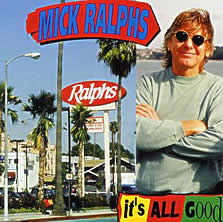 A founding member in both
Mott The Hoople and Bad Company, guitar icon Mick Ralphs
recently released a 2001 instrumental studio album on U.K.-based Angel
Air Records. Angel Air have released several Ralphís related titles
including a 1999 reissue of his Take This album as well as a pair
of Mott The Hoople CDs. According to Ralphs, the mission of Itís All
Good is "thought, feel and melody rather than speed". Itís
All Good was recorded over the past couple years and, in addition to
11 Ralphs originals, also features a rousing cover of the Freddie King track
"Hideaway", taken from the 1999 Bad Company reunion tour. The
bluesy, all-instrumental album finds Ralphs in a rocked-out, playful frame
of mind, underscored by the CD artwork picturing Mick superimposed amid
palm tree filled photos of a Ralphs supermarket in L.A. Performing all the
instruments himself (except on the live Bad Company track with Simon
Kirke and Boz Burrell), Ralphs comes off like a sonically
potent one man band getting maximum impact out of his Gibson and Fender
guitars.
A founding member in both
Mott The Hoople and Bad Company, guitar icon Mick Ralphs
recently released a 2001 instrumental studio album on U.K.-based Angel
Air Records. Angel Air have released several Ralphís related titles
including a 1999 reissue of his Take This album as well as a pair
of Mott The Hoople CDs. According to Ralphs, the mission of Itís All
Good is "thought, feel and melody rather than speed". Itís
All Good was recorded over the past couple years and, in addition to
11 Ralphs originals, also features a rousing cover of the Freddie King track
"Hideaway", taken from the 1999 Bad Company reunion tour. The
bluesy, all-instrumental album finds Ralphs in a rocked-out, playful frame
of mind, underscored by the CD artwork picturing Mick superimposed amid
palm tree filled photos of a Ralphs supermarket in L.A. Performing all the
instruments himself (except on the live Bad Company track with Simon
Kirke and Boz Burrell), Ralphs comes off like a sonically
potent one man band getting maximum impact out of his Gibson and Fender
guitars. 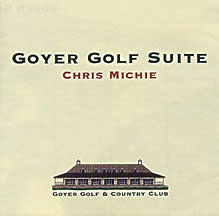 S.F. Bay Area guitarist
Chris Michie earned his reputation playing alongside Link Wray, Jerry
Garcia and Stevie Wonder as well as Van Morrisonís group between
1981-86. Michie has also released a series of fine solo albums displaying
his guitar and vocal skills. Fans of guitar instrumental music will surely
want to check out Michieís 2000 CD Goyer Golf Suite. Commissioned
by the Goyer Golf & Country Club in Holland, the 21 track, 70+ minute
disc offers a breathtaking cross-section of guitar-based instrumentals in
the spirit of melodic guitar masters like Hank Marvin and Jan Akkerman.
According to Michie, "This CD is the culmination of years of careful
and loving work that reflects the true nature of what I think guitar
instrumental music should be like." Itís a bit sad to think that
instrumental music this good made by an American artist had to be
sanctioned for release by a country club in Holland, however the melodic
intent here more than reflects Michieís affinity for instrumental guitar
music and the sport of golf. Thereís even a color CD booklet depicting
the entire course layout! A gifted guitarist and multi-instrumentalist,
Michie performs all the guitar, bass and occasional background vocals
himself with added support from several drummers and Andy Kulberg and
Jim Reitzel (both bass).
S.F. Bay Area guitarist
Chris Michie earned his reputation playing alongside Link Wray, Jerry
Garcia and Stevie Wonder as well as Van Morrisonís group between
1981-86. Michie has also released a series of fine solo albums displaying
his guitar and vocal skills. Fans of guitar instrumental music will surely
want to check out Michieís 2000 CD Goyer Golf Suite. Commissioned
by the Goyer Golf & Country Club in Holland, the 21 track, 70+ minute
disc offers a breathtaking cross-section of guitar-based instrumentals in
the spirit of melodic guitar masters like Hank Marvin and Jan Akkerman.
According to Michie, "This CD is the culmination of years of careful
and loving work that reflects the true nature of what I think guitar
instrumental music should be like." Itís a bit sad to think that
instrumental music this good made by an American artist had to be
sanctioned for release by a country club in Holland, however the melodic
intent here more than reflects Michieís affinity for instrumental guitar
music and the sport of golf. Thereís even a color CD booklet depicting
the entire course layout! A gifted guitarist and multi-instrumentalist,
Michie performs all the guitar, bass and occasional background vocals
himself with added support from several drummers and Andy Kulberg and
Jim Reitzel (both bass). 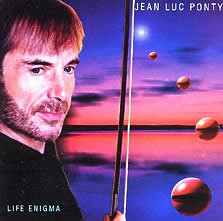 French violin great
Jean-Luc Ponty returns to his jazz-rock roots on Life Enigma, his
first album of new material in nearly eight years. The music legend adds,
"I think the best musical description Iíve ever read about me was
the Ďworld jazz fusioní, and I kind of like that." As expected,
the sound quality of the new instrumental album Life Enigma, released
on his own JLP Productions, is simply stunning, with Pontyís
violin riding high over a cosmic digitized wall of sound. Ponty adds,
"The end result is exciting. Life Enigma is the first 24-bit
digital recording Iíve ever done, and I used ProTools and a Macintosh
computer. The sound on this album is my best ever." A solid band of
musicians on hand help bring the Ponty sound up to date on Life Enigma.
Anyone who recalls those great early fusion instrumental albums Ponty
made with Frank Zappa and later with Mahavishnu Orchestra will want to
check out the recently released Jean-Luc Ponty - The Best Of The
Pacific Jazz Years on Pacific Jazz Records. A good
retrospective of the albums Ponty made for the Pacific Jazz label between
Ď68-70, the album features a number music greats including Frank
Zappa, George Duke and Ian Underwood over eleven tracks
taken from four different Ponty albums. The Best Of The Pacific Jazz
Years is complete with cool cover art, track data and new liner
notes.
French violin great
Jean-Luc Ponty returns to his jazz-rock roots on Life Enigma, his
first album of new material in nearly eight years. The music legend adds,
"I think the best musical description Iíve ever read about me was
the Ďworld jazz fusioní, and I kind of like that." As expected,
the sound quality of the new instrumental album Life Enigma, released
on his own JLP Productions, is simply stunning, with Pontyís
violin riding high over a cosmic digitized wall of sound. Ponty adds,
"The end result is exciting. Life Enigma is the first 24-bit
digital recording Iíve ever done, and I used ProTools and a Macintosh
computer. The sound on this album is my best ever." A solid band of
musicians on hand help bring the Ponty sound up to date on Life Enigma.
Anyone who recalls those great early fusion instrumental albums Ponty
made with Frank Zappa and later with Mahavishnu Orchestra will want to
check out the recently released Jean-Luc Ponty - The Best Of The
Pacific Jazz Years on Pacific Jazz Records. A good
retrospective of the albums Ponty made for the Pacific Jazz label between
Ď68-70, the album features a number music greats including Frank
Zappa, George Duke and Ian Underwood over eleven tracks
taken from four different Ponty albums. The Best Of The Pacific Jazz
Years is complete with cool cover art, track data and new liner
notes. 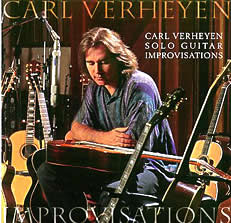 "Some of my greatest
musical experiences have been playing the acoustic guitar when no one was
around, running through improvised passages for the pure joy of hearing
them in the air". Reflecting about his latest album for the
L.A.-based Chase Music Group, Carl Verheyenís choice of words
vividly describes his love of the acoustic guitar. Just before the phone
rang for the interview, Carl told us he was mapping out some new acoustic
guitar improvisation ideas for the Beatles Ď65 favorite "Yes, It
Is", suggesting how ripe the song is for musical extrapolation.
Verheyen first amazed this fan with his dazzling 1998 CMG / Mighty Tiger
Records CD Slingshot, an album filled with his scorching, bluesy
electric guitar work, on-the-money vocals and melodic pop songwriting.
Verheyen now follows Slingshot with an album thatís completely
different sounding, yet equally convincing. The all instrumental, mostly
acoustic Solo Guitar Improvisations spans so many different guitar
genres, yet Verheyen pulls it off with the strength of a true master. One
minute moody and atmospheric, the next jazzy, bluesy or with complex New
Age overtones, humorous yet reverent, Solo Guitar Improvisations
reveals another side of Carlís complex music nature. MWE3.COM
reviews editor Robert Silverstein recently spoke with the guitar ace in a
rare one on one phone interview with Carl from his home in L.A. Gearing up
for his upcoming 2002 European tour with rock legends Supertramp, Verheyen
speaks about his new album, his love of the blues, his extensive guitars,
session work in L.A. and his all time musical heroes.
"Some of my greatest
musical experiences have been playing the acoustic guitar when no one was
around, running through improvised passages for the pure joy of hearing
them in the air". Reflecting about his latest album for the
L.A.-based Chase Music Group, Carl Verheyenís choice of words
vividly describes his love of the acoustic guitar. Just before the phone
rang for the interview, Carl told us he was mapping out some new acoustic
guitar improvisation ideas for the Beatles Ď65 favorite "Yes, It
Is", suggesting how ripe the song is for musical extrapolation.
Verheyen first amazed this fan with his dazzling 1998 CMG / Mighty Tiger
Records CD Slingshot, an album filled with his scorching, bluesy
electric guitar work, on-the-money vocals and melodic pop songwriting.
Verheyen now follows Slingshot with an album thatís completely
different sounding, yet equally convincing. The all instrumental, mostly
acoustic Solo Guitar Improvisations spans so many different guitar
genres, yet Verheyen pulls it off with the strength of a true master. One
minute moody and atmospheric, the next jazzy, bluesy or with complex New
Age overtones, humorous yet reverent, Solo Guitar Improvisations
reveals another side of Carlís complex music nature. MWE3.COM
reviews editor Robert Silverstein recently spoke with the guitar ace in a
rare one on one phone interview with Carl from his home in L.A. Gearing up
for his upcoming 2002 European tour with rock legends Supertramp, Verheyen
speaks about his new album, his love of the blues, his extensive guitars,
session work in L.A. and his all time musical heroes.